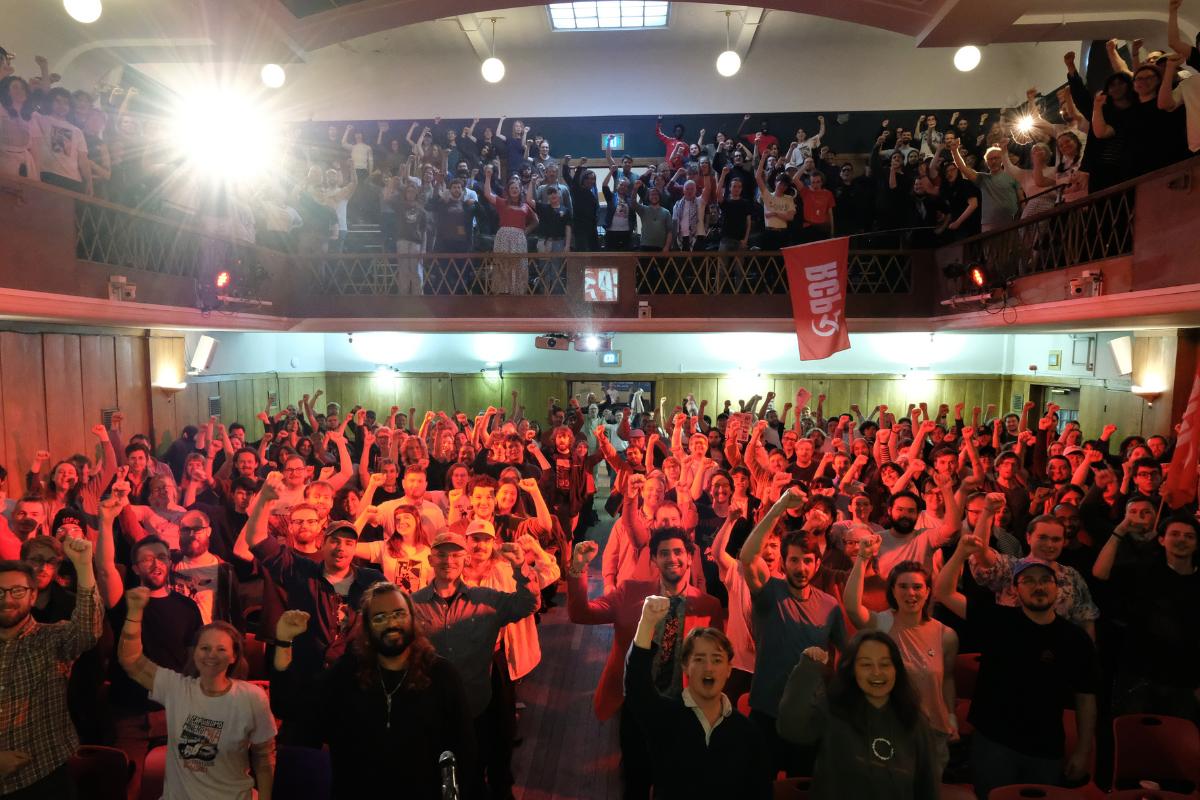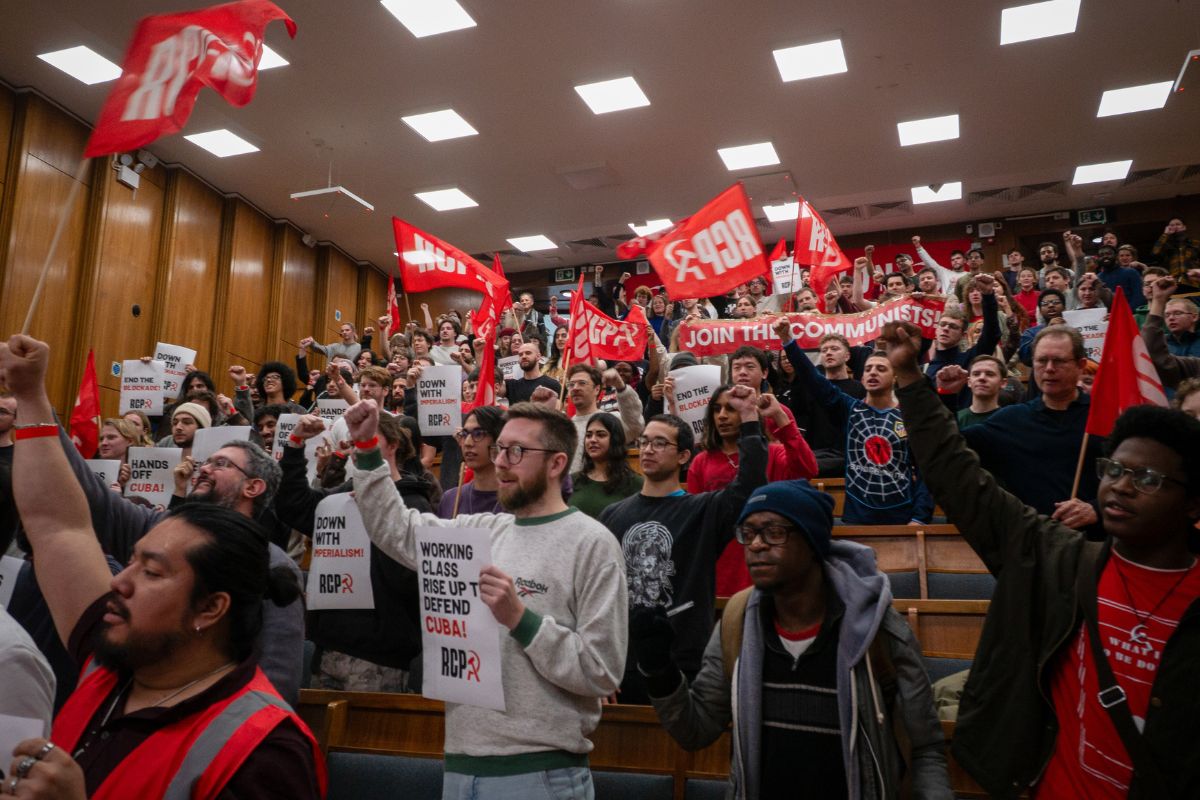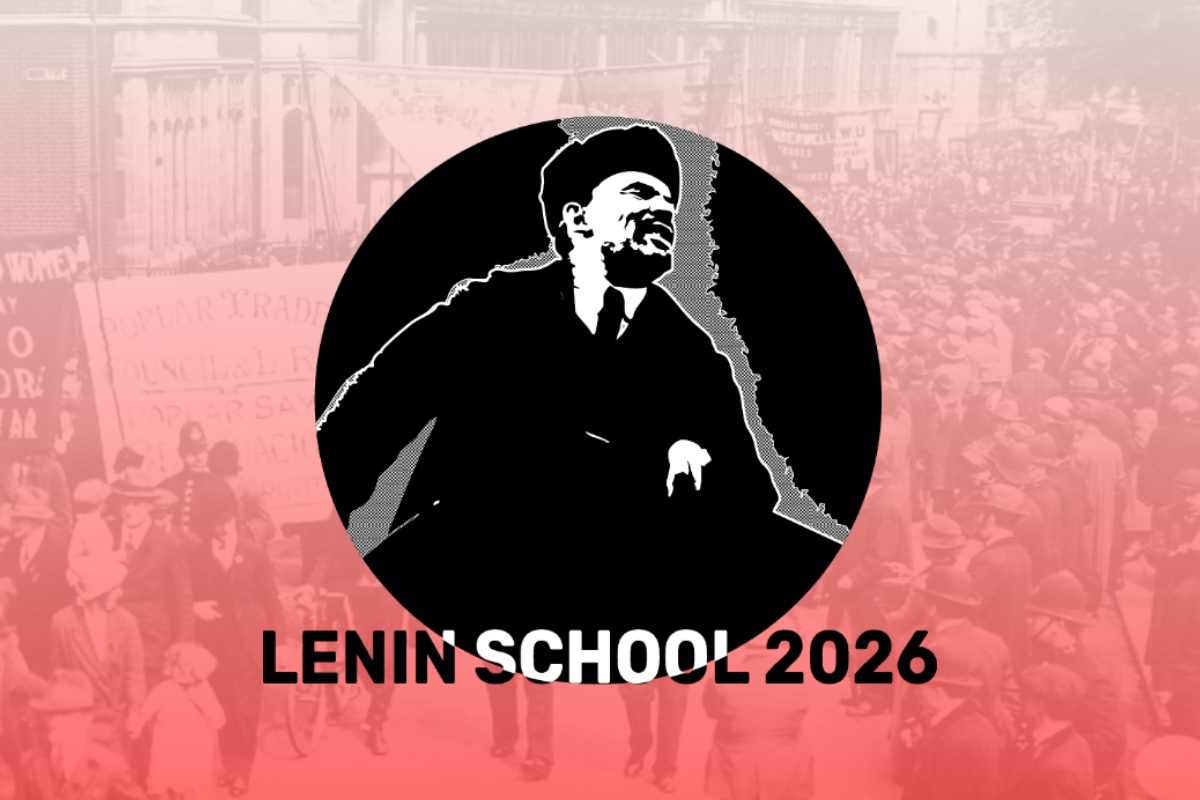This May Day weekend, from 2-5 May, 550 communists met in London for the second congress of the Revolutionary Communist Party (RCP).
This gathering could not have come at a more appropriate time, with explosive events bursting out across the world. As RCP general secretary Ben Gliniecki noted in his opening remarks:
“The [1 May] local elections have given a snapshot of the complete anger that exists among workers towards the establishment. But the key defining feature of the political situation is the total vacuum in the revolutionary leadership that can connect with this mood…
“This time last year, Rishi Sunak was still prime minister; Joe Biden was US president; the encampment movement was just starting at the universities.
“Since then, the party has gotten stuck into all major developments: the Palestine movement; our general election campaign; the counter-demonstrations against the far right last August…
“All of this, meanwhile, will have had a huge impact on consciousness.”
Against this political backdrop, on the one hand, and the immense political strengthening of the party in the last 12 months, on the other, the mood at congress was sky-high.
View this post on Instagram
Mike Hogan – a leading member of the party, who first joined our predecessor organisation, Ted Grant’s Militant tendency, in 1978 – stated that this was the best political event of his entire life.
There is no shortage of anecdotes conveying the electrifying impact of the congress on all those who attended. Every layer of the party took inspiration from this landmark event.
“I realised that I could do so much more…I really want to step up and develop myself and the party.” – Pan, party member for five years.
“We had an interesting discussion at breakfast where a new comrade was talking about how impressed he was at the level of the talks and interventions. And he said that he almost went through seven stages of grief, that he realised he thought he was this far [in educating himself], but he had to go this far now.” – Calum, member of the Leith branch
“You could really feel the excitement in the room.” – Michaela, a second time attendee of the RCP national congress, speaking about the financial collection.
“It put everything into perspective to hear the reports from the [other sections of the Revolutionary Communist] International. We are so much bigger than the branch meetings I have come to so far.” – Nick, a recent joiner.
“We got back to our accommodation at 1.30AM on Sunday. I then spent two hours talking with [another Irish comrade] in the park. We see each other all the time, but I was brimming with ideas and enthusiasm, so we couldn’t stop there.” – Mike, a member of the Irish group of the RCI.
“I lost count of how many times I got choked up or broke out in goosebumps. There is an emotional aspect to our work. We have revolutionary optimism, not based on nice-sounding hypotheticals but on real material conditions. The RCP is the living, breathing embodiment of Marxist ideas. I feel so much pride in this organisation; such camaraderie with my fellow comrades. I came away knowing I have found my life’s work.” – Annie, an RCP member of one year.
This sentiment was reflected, not only amongst RCP members, but by the venue staff also. “I have never seen a meeting in this hall with so much energy!” exclaimed the AV technician, talking to our comrades.
View this post on Instagram
World on fire
The return of Donald Trump to the White House marks the beginning of a qualitatively new phase in world relations; a turning point in the organic crisis of capitalism that has unfolded since 2008.
This message was underlined by the day-long discussion on world perspectives that opened the congress, introduced by the RCI’s leading theoretician, Alan Woods.
As multiple comrades emphasised over the weekend, only by understanding the historic significance of global events can we make sense of the deepening crisis in Britain.
In particular, Alan stressed how we are witnessing the end of an era.
“Trump is accused by the liberals of single-handedly wrecking the ‘international rules-based order’,” Alan commented.
But he added that, what the liberals assign to the ‘madness’ of a single politician, in reality reflects processes and pressures that have been brewing beneath the surface for a very long time.
Above all, Alan explained, Trump’s programme reflects the relative decline of US imperialism, the most powerful imperialist power on Earth.
Behind all the twists and turns in Trump’s trade policy lies not the lunacies of a madman, but the intensifying imperialist competition for markets and profits.
“Tariffs are nuclear missiles sent against other countries,” Alan stated. “They are weapons of war.”
At root, Alan outlined, we are seeing the symptoms of capitalism’s impasse; the barriers to the development of the productive forces imposed by private property and the nation state.
In the past, the ruling class attempted to overcome these obstacles through the immense intensification of world trade, on the one hand, and the expansion of credit, on the other. But now these factors are turning into their opposite.
Speakers from the floor gave many examples of how the global mountain of debt and intensifying trade wars are now threatening to bring about the sovereign bankruptcies and worldwide economic depression – with all the social and political ramifications that this will entail.
James Kilby, a member of the In Defence of Marxism editorial board, used the phrase of a “ticking time bomb” in reference to the global debt crisis. “The ruling class postponed the evil day for years and years,” James noted, “and now it has finally come knocking on the door.”
The debt-to-GDP ratio in the advanced capitalist countries is now around 110 percent. In the USA, it stands at 120 percent. Consequently, the money spent on servicing interest is higher than any federal department bar the military. Britain, similarly, is threatened with a ‘debt death spiral’.
The more economically backward economies will be the first to go to the wall. Already, in recent years, we have seen the question of debt leading directly to revolutionary movements in places like Sri Lanka and Kenya.
The trade war is only bound to make things worse. “These countries rely on a trade surplus for US dollars to repay the debt,” James continued. “But that surplus is precisely the thing that Trump wants to stamp out.”
In other words, as Alan explained, protectionism means the export of social problems to other countries. ‘America First’ means the rest of the world last.
The trade war will plunge the whole world deeper into chaos. Niklas Albin Svensson, a leading member of the RCI, gave a clear example demonstrating the immense dislocation that heightening tariffs will cause:
“A part which is used in both Boeing and Airbus aircrafts, CFM56, is produced independently in both the US and France for each of the monopolies, respectively.
“But a significant part of the parts used to make this part are produced in one single factory. Now you have a situation where it will become cheaper for what used to be one factory to become two, three or four.
“This is the massive impact on productivity that the breakup of the international division of labour has.”
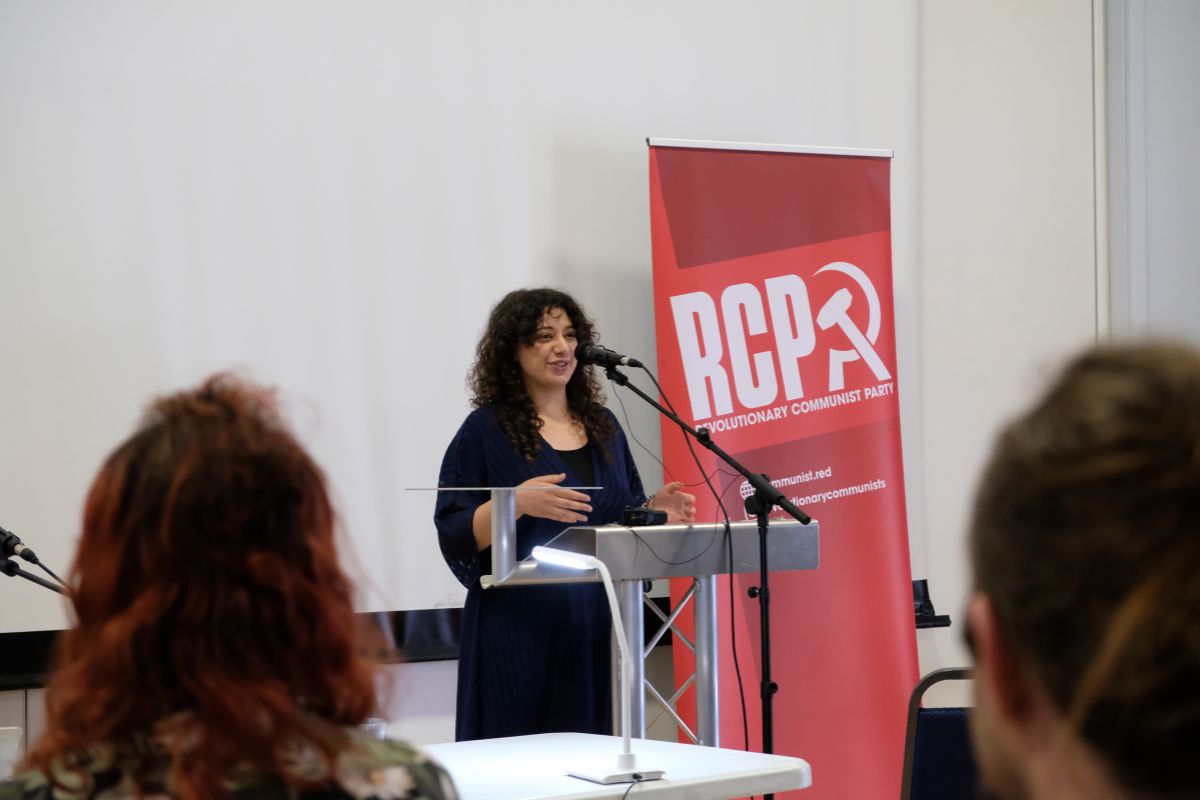 Clearly, there is – and will be – no lack of hammer blows to rock the consciousness of the exploited and oppressed masses everywhere.
Clearly, there is – and will be – no lack of hammer blows to rock the consciousness of the exploited and oppressed masses everywhere.
As the examples of Sri Lanka and Kenya – and, more recently, Greece and Serbia – highlight, unless a powerful revolutionary party is built in advance, the ruling class will always manage to stabilise the situation, even in the face of tremendous mass movements.
In short, in the absence of a clear revolutionary leadership, the wars, crises, and misery of capitalism will continue and worsen. The alternative facing society is clear: socialism or barbarism.
“We have to build the party like the whole of the future history of humanity depends on us,” Ben Gliniecki proclaimed. “Because it does.”
Crisis of British capitalism
Caught up in the cross-currents of the tempest engulfing the world is Britain: one of the weakest of the advanced capitalist countries, and thereby where all of capitalism’s contradictions can be seen in concentrated form.
Rob Sewell, RCP political secretary, opened the third day of congress with a discussion on the perspectives for the British revolution, and the tasks facing our party.
“What is remarkable is the degree of collapse of British capitalism, in its depth and its scope,” Rob commented. “This decline was disguised for an historical period because of the Empire, and the upswing of the post-war boom. But now it is clear for all to see.”
Rob pointed out the long-term industrial decline of the former “workshop of the world”. Britain now has 2.7 million industrial workers, and declining, compared to 4.5 million in 1992.
“Thousands of years ago, the Ancient Egyptians built using bricks – and they built the Pyramids,” Rob noted. “Today, Britain doesn’t produce enough building bricks and has to import them from Australia!”
“We have to import iron ore and coal to make steel in Britain,” Rob continued, “yet we sit on enough coal to extract for 700 years!”
The decline of British capitalism is leading to severe social degradation. One million young people in Britain are now not in employment, education, or training. “That’s one million young people who are discarded by capitalism,” Rob stated.
“It is no accident that the Tories suffered the greatest electoral defeat in history,” Rob explained. “This reflects the situation of anger building up in society.”
View this post on Instagram
All of this anger is desperately trying to find its way to the surface. And it is finding a temporary and partial expression in the form of Reform UK.
But as a reactionary demagogue with no solutions to British capitalism’s crises, any support for Farage will rapidly turn to bitterness should he come to power.
Comrades explained how we can expect many other expressions of the accumulating pressures and combustible material in society in the period ahead: splits in Labour; the rise of new parties and formations; anti-political movements; and industrial struggles.
Unfortunately, however, at the present time, we are faced with perhaps the weakest left in history. Consequently, there is an enormous political vacuum in Britain; a complete lack of any reference point for all the burning anger and energy amongst workers and youth.
The leaders of the trade union movement bear particular responsibility for this situation, as Mike Hogan discussed in one contribution to the debate:
“[TUC general secretary] Paul Nowak praised Ernest Bevin [a leading minister in the 1945 Labour government] for using what he called ‘diplomacy, not strikes’ – using ‘intelligence’ against the bosses.
“Well, the intelligent thing is to go on strike!”
Sooner or later, however, the trade unions will be forced into semi-opposition to Starmer’s austerity – as the example of the ongoing indefinite strike by refuse workers in Birmingham demonstrates.
Multiple comrades went on to explain that, even where such industrial militancy does arise, workers’ struggle will always be held back by the narrow outlook of the labour movement leaders, who do not look beyond capitalism for a solution.
View this post on Instagram
“We are not just fighting for better terms,” Mike concluded.
“Lenin said that our party ‘leads the struggle of the working class, not only for better terms for the sale of labour-power, but for the abolition of the social system that compels the propertyless to sell themselves to the rich’.
“Our party is about building a paradise on Earth! Our party is about communism! Our party is for the liberation of humanity from the filth of war, capitalism, and imperialism!”
Recruiting for revolution
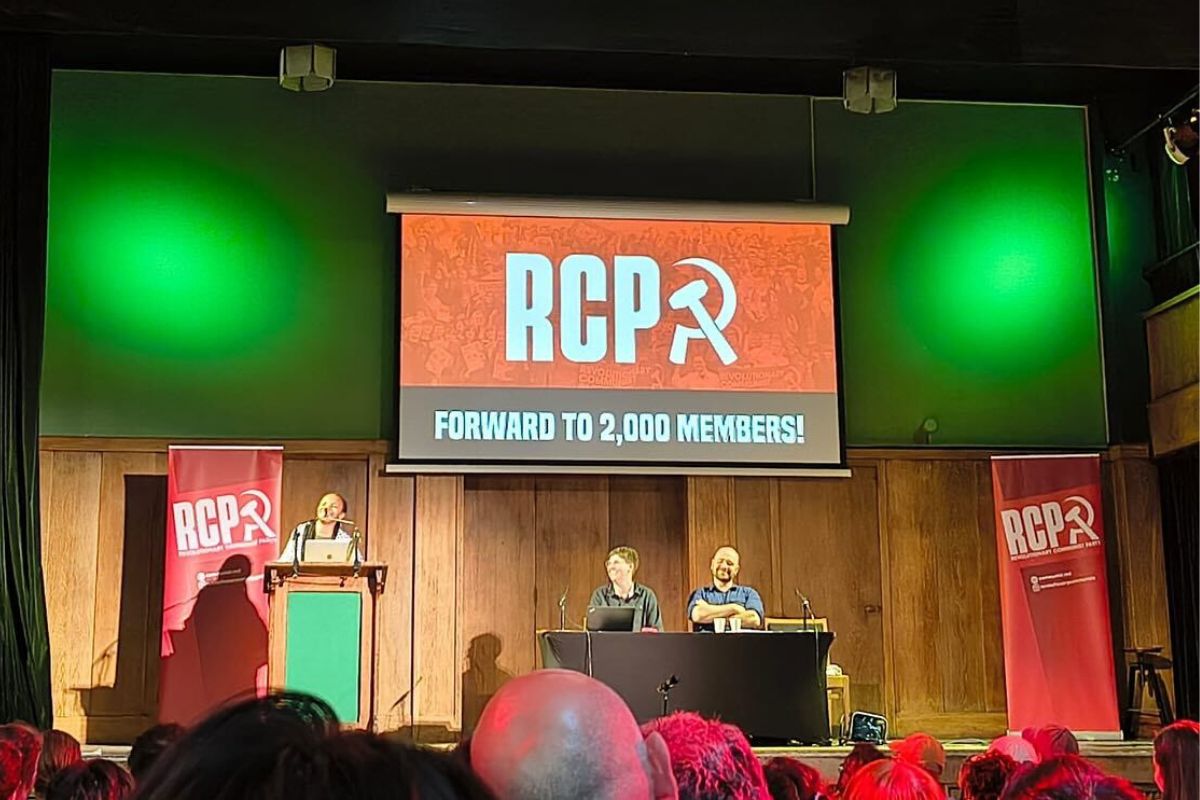 Based on this inspiration and understanding, congress went on to discuss our tasks in the period ahead.
Based on this inspiration and understanding, congress went on to discuss our tasks in the period ahead.
The foundations for future successes have already been laid. Importantly, throughout the weekend, several comrades underlined the conquest that the party has achieved in reclaiming the banner of communism in recent years.
As a result, radicalised young people looking for a genuine revolutionary alternative are increasingly coming across our party, based on the ideas of Marxism and traditions of Bolshevism.
We have achieved this momentous milestone within a year of founding the RCP. Through bold initiatives, like Fiona Lali’s campaign in the last general election, we have well and truly placed ourselves on the map.
Providing the organisation report on the final day of discussion, Ben Gliniecki outlined that the last year has seen a strengthening of all aspects of our party: from education to finances.
But from an understanding of perspectives flows the understanding that we are still far too small a force for the historic tasks confronting us.
All forces in the party must therefore be focussed on the point of attack: to recruit and consolidate a new layer of communists and class fighters.
This is why the RCP is launching a recruitment campaign. From now until the end of the summer, we aim to recruit 200 new members, rallying workers and youth with the call for a ‘revolution against the billionaires!’
Comrades came away from congress with enormous confidence in this goal. “When we set our minds to it, we always achieve what we set out to do,” Ben concluded. “I know we will recruit 200 people. I know we will consolidate them.”
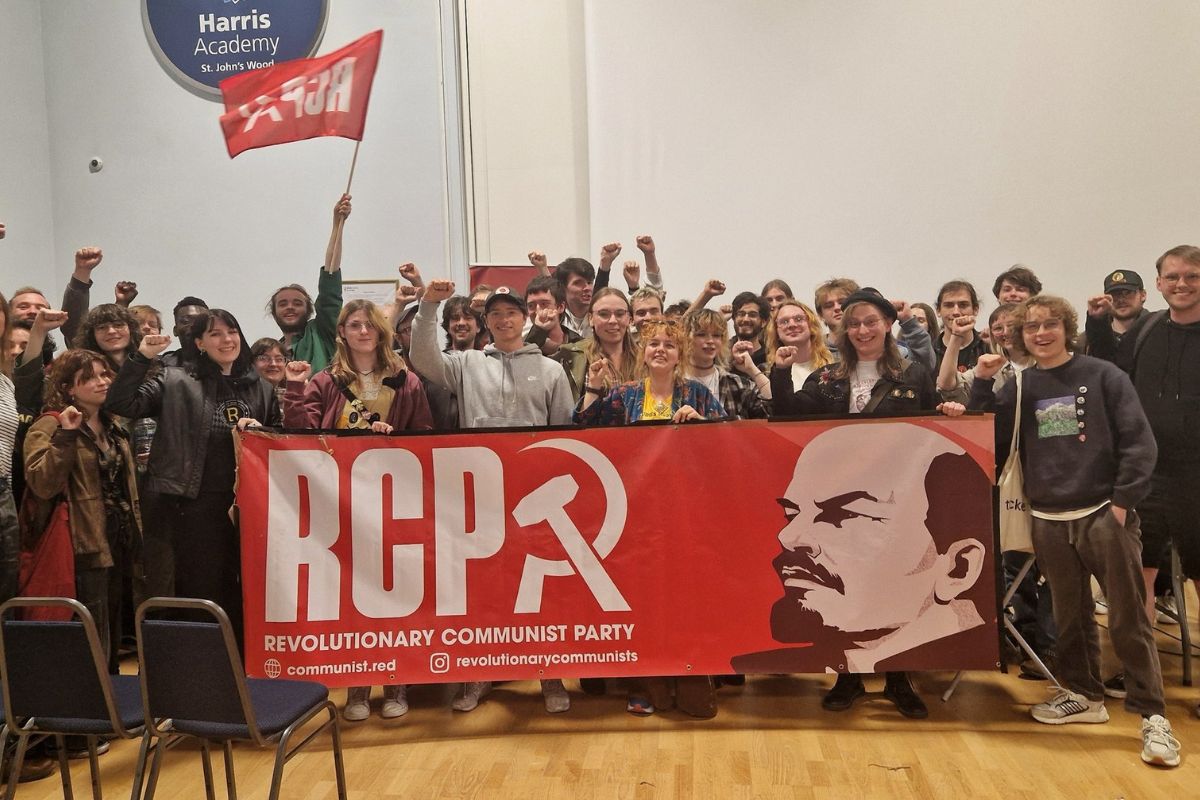 This optimism is entirely justified. During the congress itself, the party took significant strides forwards. RCP branches collectively donated an astonishing £140,000 in response to the fighting fund appeal. And comrades pledged a total of £4,000 per month in the form of membership dues increases.
This optimism is entirely justified. During the congress itself, the party took significant strides forwards. RCP branches collectively donated an astonishing £140,000 in response to the fighting fund appeal. And comrades pledged a total of £4,000 per month in the form of membership dues increases.
Some of these pledges were truly exceptional, including increases from a £6.50 monthly donation to £100; £50 to £230; and £55 to £450!
These incredible displays of sacrifice were one of many indications of the inspiring impact that year’s congress had on comrades.
Similarly, after the event officially ended, attendees immediately began to discuss plans for building the party on their journeys home.
We still have a long way to go. But RCP comrades are ready to rise to the challenge.
We have confidence in ourselves and in the power of the working class – above all, because of our confidence in the ideas of Marxism: “our invincible weapon” in the fight to overthrow capitalism, as Fiona put it in her closing remarks, before a final stirring rendition of the Internationale.
View this post on Instagram
Ben summarised this revolutionary boldness and audacity, not by quoting Marx or Lenin, but with the words of TE Lawrence:
“All men dream, but not equally. Those who dream by night in the dusty recesses of their minds wake up in the day to find it was vanity. But the dreamers of the day are dangerous men, for they may act their dreams with open eyes, to make it possible.”
“That is us,” Ben concluded, to energetic applause. “We are the dangerous dreamers!”

